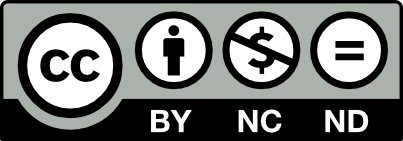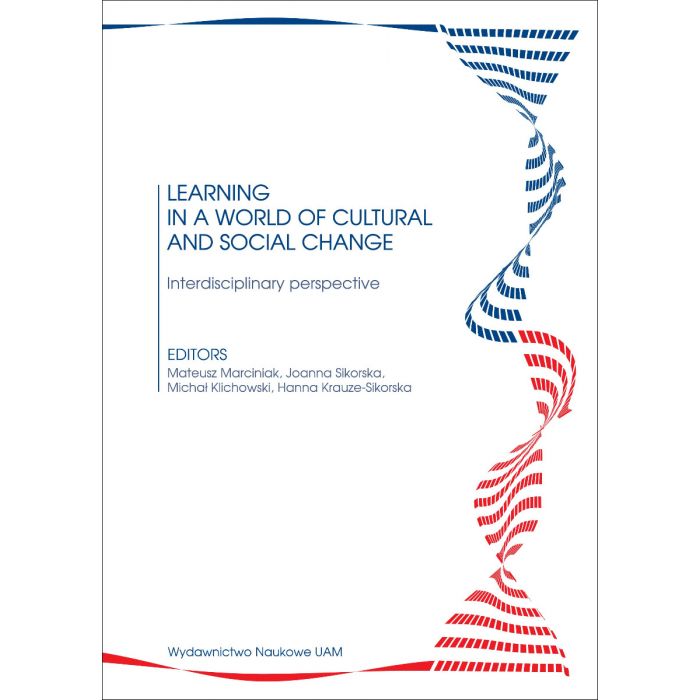Learning in a world of cultural and social change. Interdisciplinary perspective
- In Stock: out of stock
- ISBN: 978-83-232-4228-4 (PDF)
- DOI: 10.14746/amup.9788323242284
- Category: Open Access, Psychology and Education, E-books
- Year of publication: 2023


Temat uczenia się jest bardzo aktualny, a badania nad uczeniem się stanowią trend w analizach naukowych. Autorzy publikacji przyjęli za cel ścisłe powiązanie pracy badawczej z działaniami praktycznymi, tak by wypracowane zalecenia/wnioski były łatwe do zastosowania w autentycznych sytuacjach uczenia się i mogły służyć zmianie praktyki edukacyjnej.
Książka podzielona jest na trzy części. Pierwsza część skupia się na różnych obecnych procesach i zjawiskach. Dotyczy ona wybranych przemian cywilizacyjnych, które można uznać za tło dla analizowanych w kolejnych rozdziałach procesów uczenia się i nauczania. Druga przybliża misję edukacji w dobie ponowoczesności, koncentrując się na uczeniu się, rozwijaniu i wspieraniu kompetencji niezbędnych obywatelom współczesnego świata. Ostatnia – podejmuje kwestię znaczenia nowych mediów i narzędzi ICT w procesach uczenia się i nauczania.
Monografia nie aspiruje do miana kompleksowego przeglądu współczesnej edukacji, uczenia się i nauczania. Jest raczej zaproszeniem do refleksji nad wzajemnymi powiązaniami między szybko zmieniającą się rzeczywistością a procesami edukacyjnymi.
Zbyszko Melosik, Foreword
Editors, Introduction
PART I: CHANGING REALITY – THE IMPORTANCE OF GLOBALIZATION AND LOCALITY
Agnieszka Cybal-Michalska, The proactive orientation of a subject as an investment process in the career in the world of “boundaryless careers”
Małgorzata Rosalska, Distinctive skills as a part of career project
Orit Haller-Hayon, Yael Ilany, Work-home conflict among Israeli lawyers – working from home before and during the COVID-19 pandemic
Gaida Fahoum Khatib, Women’s contribution in al-Mahğar literature
Jumana Mussa, Illness, identity and mutability in Nicole Krauss’ “Man Walks into a Room”
Witold Wrzesień, The new dimension of generational differentiations
PART II: MISSION OF EDUCATION IN A (POST)MODERN ERA – MOTIVATION, DEVELOPMENT AND SUPPORT
Mateusz Marciniak, Marina Metz, Intercultural learning of academic students during the short-term international exchange
Lydia Tass, Anna Ewert, Embracing linguistic diversity in the classroom
Karolina Domagalska-Nowak, Supporting migrant children in learning Norwegian as a second language. A socio-pedagogical study
Hanna Krauze-Sikorska, Reuven Feuerstain’s concept of optimizing the support and assistance of a student with a specific learning disorder
Michalina Kasprzak, Fostering children’s creativity in local forms of support and care – educational contexts
Laila Abu Ahmad, Meaningful learning – fiction or reality?
Anna Borkowska, Sylwia Jaskulska, The importance of students’ active role in the educational process in the context of the theoretical assumption of STEAM education
PART III: NEW MEDIA AS AN EDUCATIONAL CHALLENGE – IMPLICATIONS FOR CRITICAL MEDIA LITERACY
Joanna Sikorska, The potential of ICT in the process of learning a foreign language by school-age children and adolescents
Maha Abu Hatoum, Tomasz Przybyła, Transition to middle school for students with math difficulties in the digital era – challenges and opportunities
Dror Krikon, The impact of smartphone on child and youth independence in the age of social networking and global news
Zohar Biber, Parental involvement in school-ways of communication between teachers and parents
The topic of learning is fashionable, and studies on learning constitute a trend in research. Following these trends, however, one must remember that learning research should be conducted in a way that closely links them to practical measures. They should thus be easily applied in authentic learning situations and serve to change educational practice. That was our goal in creating this book. On the one hand, we decided to consider current scientific trends in learning research. On the other, we also wanted our analysis to have a practical dimension. The book is divided into three interrelated parts. The first section focuses on various processes and phenomena shaping our current reality. It concerns selected civilizational transformations, which might be considered the background for the learning and teaching processes analyzed in the subsequent chapters. The second part of the monograph provides insight into the mission of education in the postmodern era, with a focus on learning, development and support for the competencies essential for citizens of the present-day world. The final part tackles the meaning of new media and ICT tools in learning and teaching processes. The monograph does not aspire to be a comprehensive overview of contemporary education, learning and teaching. It is rather an invitation for readers to reflect on mutual connections between the rapidly transforming reality and educational processes.
| Detailed information | |
|---|---|
| Wprowadzenie |
Download file

|
| Spis treści |
Download file

|
|
|
|
| Publication Version | e-book, open access |
| Language | angielski |
| Title (EN) | Learning in a world of cultural and social change. Interdisciplinary perspective |
| Type of publication | Monografia |
| Edition | I |
| ISBN | 978-83-232-4228-4 (PDF) |
| DOI | 10.14746/amup.9788323242284 |
| Number of pages | 268 |
